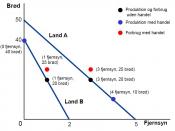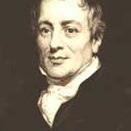The goal of this paper work is the evaluation of the article published in The Australian, on 21st April 28, 2008. The article is the comment of Mr. Ban Ki-moon UN General Secretary, about the increasing food prices globally and the possibility of further globalization helping in fixing this problem. Mr. Ban reckons that many countries had taken steps in barring the exports of wheat and rice, or introducing incentives for easier imports of these products. If we look into the theories of international trade, the first issue to be noted is the strengths of various countries, in accordance with the different food product lines being planned. The Production Possibility Frontier shows the best combination one can produce.
Production Possibility Frontier (PPF) measures the maximum combination of outputs one can get from a given number of inputs (UOP Simulation). For instance, in Australia, my workplace produces a variety of food supplies.
We always want to produce the maximum amount of each product possible as they each require different components and labor times. It would be ineffective to produce only one product supply because our customers have different configurations of integrated products. It would also be ineffective for production to attempt to make every different product every day. There is a production schedule in place to maximize production output and keep a varied stock.
In this article Mr. Ban clearly raises the point of further globalization, where the countries have to work as a group to control the increasing food prices. So here comes the theory of Comparative Advantage into action. In Principles of Political Economy, David Ricardo reinforced the case for free trade in the early nineteenth century (Irwin, 2001). The basic idea of the principle of Comparative Advantage is that as long as the relative opportunity costs of producing...


